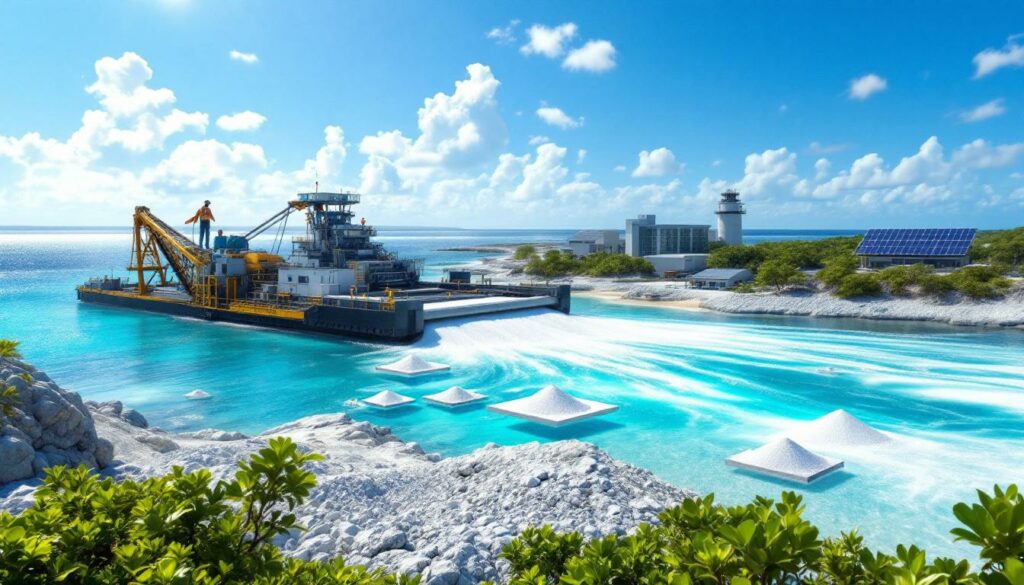What is Kenmare Resources and its significance in Mozambique?
Kenmare Resources operates the Moma titanium dioxide mineral sands mine in Mozambique, where it has maintained a presence for nearly 40 years. As the third-largest global producer of titanium minerals, Kenmare plays a crucial role in supplying ilmenite, zircon, and rutile—essential materials used in everyday applications tied to global economic growth. The company's operations in Mozambique represent a long-term commitment, with active production spanning almost two decades and projected to continue for another 80-90 years based on current reserve estimates.
"Our products—ilmenite, zircon, and rutile—are used in day-to-day applications and closely linked to global economic growth," explains Tom Hickey, Managing Director of Kenmare Resources. "The Moma operation is exceptional not just for its scale but for its multi-generational lifespan."
Kenmare's operational footprint extends beyond resource extraction to significant employment contribution. The company employs approximately 1,700 people, with an impressive 97% being Mozambican nationals. This commitment to local workforce development includes promoting Mozambican talent to leadership positions, exemplified by Hijino Jim, who serves as General Manager after more than a decade with the company.
Economic significance and employment contribution
The economic impact of Kenmare's operations ripples throughout Mozambique's economy. Beyond direct employment, the company's presence has fostered skills development, knowledge transfer, and capacity building among local communities. The company's practice of prioritizing local employment has created a sustainable economic foundation in an area previously lacking significant industrial development.
Kenmare's approach to developing local talent sets it apart from many extractive industry operations in Africa. Rather than relying heavily on expatriate management, the company has invested in training and promoting Mozambican nationals, creating genuine career pathways. This strategy has yielded dividends not only in operational efficiency but also in strengthening relationships with government stakeholders and local communities.
Why is the investment agreement renewal critical for Kenmare?
The renewal of Kenmare Resources' investment agreement in Mozambique represents a pivotal moment in the company's history. As one of the first companies to develop such agreements in Mozambique over 20 years ago, Kenmare secured favorable terms in its original 2004 agreement. Now, with that agreement up for renewal, the process carries significant implications for the company's long-term operations and financial performance.
Historical context of the investment agreement
When Kenmare negotiated its initial investment agreement, Mozambique was still emerging from civil conflict and eager to attract foreign investment. The terms reflected the higher risk profile of operating in the country at that time. However, as Tom Hickey acknowledges, while the company "got a good deal in 2004," Kenmare has exceeded all commitments made under that agreement.
"We've invested more, produced more, employed more people, paid more taxes, and implemented effective social programs that have positively impacted surrounding communities," Hickey explains. This track record of delivering beyond obligations has positioned Kenmare favorably in renewal negotiations, though both parties recognize the economic landscape has evolved significantly.
Changing economic landscape in Mozambique
The Mozambique of 2024-2025 presents a markedly different investment environment compared to 2004. The country has attracted multiple international investors across various sectors, particularly following major natural gas discoveries. This changed dynamic has created different governmental priorities and pressures.
Recognizing these shifts, Kenmare has proposed adjustments that would provide the Mozambican government with an improved return from the project while highlighting the company's planned investments over the next two decades. This approach acknowledges the country's legitimate interest in capturing greater value from its natural resources while ensuring the continued viability of African beneficiation opportunities.
Strategic engagement with government leadership
Kenmare's management has engaged directly with President Nyusi to discuss the agreement renewal, emphasizing the company's achievements, transparent operations, and community contributions. These high-level discussions have focused on Kenmare's potential to contribute further to Mozambique's development over the next 20 years.
"President Nyusi is quite commercial and pragmatic," notes Hickey. "He understands that foreign direct investment will be vital to Mozambique's expansion and development plans." This alignment of interests provides a foundation for productive negotiations, though finalizing terms that satisfy all stakeholders remains a complex process.
How does the agreement renewal process affect Kenmare's operations?
Despite the strategic importance of the investment agreement renewal, Kenmare's day-to-day operations continue unaffected during negotiations. This operational continuity provides important stability for the company's employees, customers, and investors while discussions proceed.
Operational continuity during negotiations
The structure of the original agreement ensures that Kenmare continues to operate under its existing terms until a new agreement is finalized. As Hickey explains, "It doesn't affect our license to mine. It doesn't affect any of our employees." The primary change expected from the new agreement would be an adjustment to the royalty rate paid on production, which would impact financial performance but not operational capabilities.
Even in the unlikely scenario where negotiations reach an impasse, the existing contract contains protections that would trigger a dispute resolution process without disrupting mining activities. This contractual framework allows Kenmare to maintain focus on operational excellence while pursuing agreement renewal.
Support from diplomatic and investment partners
Kenmare has received valuable support from various stakeholders during the renewal process. The Irish ambassador, EU ambassador, and UK high commissioner have all engaged with Mozambican authorities, highlighting Kenmare's positive contributions to the country's development.
Additionally, the Oman Investment Authority, which holds a 17% stake in Kenmare and has been a shareholder for nearly a decade, represents another significant voice in the process. The Omani sovereign wealth fund's future investment decisions in Mozambique may be influenced by how the government approaches negotiations with established investors like Kenmare.
Transparency as a competitive advantage
One of Kenmare's strongest assets in the renewal process is its reputation for transparency. "Kenmare has been recognized as the most transparent company in Mozambique for four or five consecutive years," Hickey notes with pride. This recognition, combined with the company's track record as a responsible corporate citizen, has helped establish Kenmare as precisely the type of company Mozambique seeks to attract and retain.
The company's transparency extends beyond regulatory compliance to include meaningful engagement with local communities, open communication about environmental impacts, and clear reporting on economic contributions. This approach has built trust with government stakeholders and strengthened Kenmare's negotiating position.
What capital investments is Kenmare making despite market challenges?
Despite facing market headwinds, Kenmare continues to make substantial capital investments to secure its long-term future in Mozambique. These strategic investments focus on accessing higher-grade deposits, optimizing operational efficiency, and increasing production capacity.
Strategic relocation to Nakatari ore body
The centerpiece of Kenmare's investment strategy is relocating one of its largest mining plants to the Nakatari ore body, which represents 70% of the company's reserves. This major undertaking involves an investment exceeding $300 million over a three-year period, according to a recent announcement on their expansion plans.
"The future of Kenmare will be dictated by this ore body called Nakatari," explains Hickey, underscoring the strategic importance of this move. The relocation includes the acquisition of two new dredges at a cost of $66 million, which are currently positioned offshore Mozambique awaiting deployment.
The Nakatari relocation exemplifies Kenmare's long-term commitment to its Mozambican operations. By investing heavily during a period of market softness, the company aims to position itself advantageously for the next market upswing while demonstrating confidence in the jurisdiction to government stakeholders.
Selective Mining Operations (SMO) implementation
Complementing the Nakatari investment, Kenmare has recently deployed a new approach through its Selective Mining Operation—a small, mobile, and flexible plant capable of accessing mineral deposits that larger plants cannot efficiently mine. This innovative solution allows Kenmare to supplement existing production during transition periods and respond rapidly to emerging market opportunities.
The first SMO, with a capacity of 300 tons per hour, cost approximately $6 million—significantly less than the $45 million invested in the company's smallest principal mining plant (WCP C) in 2019, which processes 500 tons per hour. This cost-effective approach enables Kenmare to optimize resource extraction while maintaining capital discipline.
Production expansion goals
Through these combined investments, Kenmare aims to increase its production from the current level of approximately 1 million tons of ilmenite annually to 1.2 million tons over the next few years. The company views these capital expenditures as the last major investments required for the medium term, positioning Kenmare to generate significant free cash flow within 2-3 years.
This production growth strategy aligns with Kenmare's market positioning as a reliable, high-quality supplier. By increasing output as competitors struggle with market challenges, the company aims to strengthen its market share and customer relationships during the downturn.
How is Kenmare navigating current market challenges?
The titanium dioxide market is currently experiencing headwinds, presenting Kenmare with complex challenges that require strategic navigation. Understanding these market dynamics and Kenmare's response provides insight into the company's resilience and competitive positioning.
Market dynamics and pricing pressures
The titanium dioxide market is currently experiencing a modest oversupply, partly due to new market entrants responding to the high pricing environment of 2021-2022. This situation has created downward pressure on prices, impacting margins across the industry.
Hickey draws an important distinction between this transient oversupply and the long-term structural balance of the market: "There's no major new conventional projects requiring hundreds of millions in investment." He compares current conditions to similar market dynamics in 2011-2012 when Vietnamese and Indonesian producers entered during high prices but subsequently exited when the market normalized.
Recent market interventions have provided some support. European Union tariffs of 38-39% imposed on Chinese titanium dioxide pigment have improved demand for Western producers' raw materials, including Kenmare's products, creating a more favorable competitive landscape in key markets.
Customer relationships and product differentiation
Despite challenging market conditions, Kenmare has maintained its ability to sell all production due to the quality and consistency of its products. "All supply is not equal," emphasizes Hickey. "Kenmare, because of its consistency, quality, and longevity, is probably a preferred supplier."
This preferred supplier status is reinforced by industry consolidation trends. One customer reported having only two suppliers now compared to eight suppliers seven years ago, highlighting how buyers are concentrating their purchasing with reliable producers who can deliver consistent quality and volume.
Kenmare has further strengthened its market position by signing new contracts with customers in the Middle East, diversifying its geographic sales footprint and reducing dependence on any single market or region.
Financial resilience and margin protection
Even with lower market prices, Kenmare has maintained robust financial performance. The company achieved a 40% EBITDA margin in the previous year—a decrease from the exceptional 60% margin in 2022 but still representing strong profitability for a mining operation.
This financial resilience enables Kenmare to cover reinvestment obligations, maintain lender confidence, and sustain dividend payments to shareholders even during a market downturn. The company's strategic shift toward higher-value market segments has been particularly effective in protecting margins, with approximately 20% of sales now directed to titanium metal or secondary processing applications—higher than the industry average of less than 10%.
What are Kenmare's future prospects and strategic priorities?
Looking ahead, Kenmare has established clear strategic priorities that balance operational excellence, capital discipline, and long-term growth opportunities. These priorities reflect the company's commitment to creating sustainable value for all stakeholders.
Operational focus and capital discipline
For the next 2-3 years, Kenmare's primary focus remains operational excellence—successfully completing the Nakatari relocation, meeting production targets, and executing capital projects safely and within budget. As Hickey succinctly puts it, "Operations is strategy."
This operational focus reflects the company's pragmatic approach to value creation. By ensuring the successful execution of current projects before embarking on new initiatives, Kenmare aims to maximize returns on invested capital and strengthen its financial position.
The company maintains disciplined oversight of its balance sheet, with net debt projected to peak at $80-85 million before declining as capital expenditure decreases and free cash flow generation accelerates. This prudent financial management provides flexibility while maintaining covenant headroom with lenders.
Dividend policy and shareholder returns
Despite ongoing capital investments, Kenmare remains committed to its dividend policy, announcing an interim dividend of 8-12 cents per share. This commitment reflects the company's balanced approach to capital allocation, recognizing the importance of returning value to shareholders even during investment phases.
"Dividend payments are not only income for shareholders but also an indication of capital discipline," explains Hickey. The company views maintaining dividends as a signal that management remains focused on shareholder returns and will not reinvest all cash flow regardless of project quality.
This shareholder-focused approach has received positive feedback from investors who appreciate the company's commitment to balancing growth investments with consistent returns. As capital expenditures decrease and free cash flow increases, Kenmare expects to enhance shareholder returns further.
Long-term growth opportunities
Beyond the current investment cycle, Kenmare has identified additional growth opportunities, including potential expansion at Congolone, located 40-70 km north of current operations. However, the company emphasizes that such expansions would only proceed when market conditions, shareholder support, and capital availability align favorably.
This measured approach to growth reflects Kenmare's commitment to disciplined expansion. Rather than pursuing growth for its own sake, the company evaluates potential projects based on their ability to create sustainable value without overextending financial resources or operational capabilities.
How does Kenmare address environmental and sustainability concerns?
Sustainability represents an increasingly important dimension of Kenmare's operations and market positioning. The company has implemented various initiatives to minimize environmental impact while maximizing positive social contributions.
Renewable energy utilization
Approximately 95% of Kenmare's energy comes from renewable sources in Mozambique, primarily hydroelectric power. This high renewable energy percentage results in a significantly lower carbon footprint for Kenmare's products compared to many competitors, particularly those operating in regions with coal-dominated electricity grids.
This environmental performance is becoming increasingly important in discussions with customers concerned about Scope 2 and Scope 3 emissions in their supply chains. As manufacturers face growing pressure to reduce carbon intensity throughout their value chains, Kenmare's low-carbon products offer a competitive advantage in environmentally conscious markets.
Chemical-free processing
Kenmare emphasizes that its operations do not use harmful chemicals in processing, further enhancing the environmental credentials of its products. The company's mineral separation process relies on physical properties like density and electrostatic characteristics rather than chemical reactions, eliminating risks associated with chemical reagents.
This natural processing approach aligns with growing market demand for responsibly sourced materials with minimal environmental impact. For customers in sensitive applications like food packaging, medical products, or consumer goods, Kenmare's chemical-free processing represents an important selling point.
Community investment and social license
The company has implemented extensive social programs that have made meaningful differences in communities surrounding the mine. These initiatives, ranging from education and healthcare to infrastructure development and local business support, have strengthened Kenmare's social license to operate in Mozambique.
By developing strong relationships with local communities and demonstrating tangible benefits from its presence, Kenmare has created a positive feedback loop that supports its long-term operations. This social investment strategy complements the company's environmental initiatives to create a comprehensive sustainability approach that includes extensive mine reclamation innovation.
What factors will drive recovery in the mineral sands market?
While current market conditions present challenges, several factors could drive recovery in the mineral sands market over the medium term. Understanding these potential catalysts provides context for evaluating Kenmare's strategic positioning and future prospects.
Economic stabilization in China
A key driver for future price growth will be stability and clarity regarding the Chinese economy. As the world's largest consumer of titanium dioxide, China's economic health directly impacts global demand for mineral sands.
Recent weeks have shown some positive indicators, including encouraging CPI data, but the market remains cautious about prematurely predicting a Chinese economic recovery after several false starts in recent years. Hickey notes that genuine evidence of sustainable growth in China would likely trigger improved sentiment across the mineral sands market.
The potential relaxation of Chinese property sector restrictions could provide additional support, as construction activity drives significant demand for titanium dioxide pigment used in paints, coatings, and building materials.
Global reconstruction efforts
Potential reconstruction activities in regions like Ukraine or Gaza could stimulate demand for titanium minerals, as these materials are essential components in construction and rebuilding efforts. Titanium dioxide pigment is used extensively in paints, coatings, and construction materials, making post-conflict reconstruction a potential demand catalyst.
While the timing and scale of such reconstruction efforts remain uncertain, they represent a potential source of incremental demand that could help rebalance the market. Historical precedents from other post-conflict regions suggest that reconstruction-driven demand can be substantial and sustained over multiple years.
Global GDP growth correlation
Historically, titanium dioxide demand and pricing have been closely linked to global GDP growth. As economic growth returns and interest rates potentially decrease, investment activity should increase, driving demand for Kenmare's products across various end-use sectors.
This correlation with broader economic activity provides a foundation for market recovery as global growth stabilizes. Central bank policies shifting toward easing cycles could provide additional support by stimulating construction and manufacturing activity—key demand sources for titanium dioxide.
Market segmentation strategy
Kenmare has strategically oriented its marketing efforts toward higher-value market segments, shifting away from more competitive sulfate ilmenite areas toward titanium metal or secondary processing applications. While these applications represent less than 10% of
Looking to Benefit from the Next Major Mineral Discovery?
Stay ahead of the market with Discovery Alert's proprietary Discovery IQ model, which instantly notifies investors of significant ASX mineral discoveries, turning complex data into actionable insights. Visit the Discovery Alert discoveries page to understand why major mineral discoveries can lead to significant market returns and begin your 30-day free trial today.




